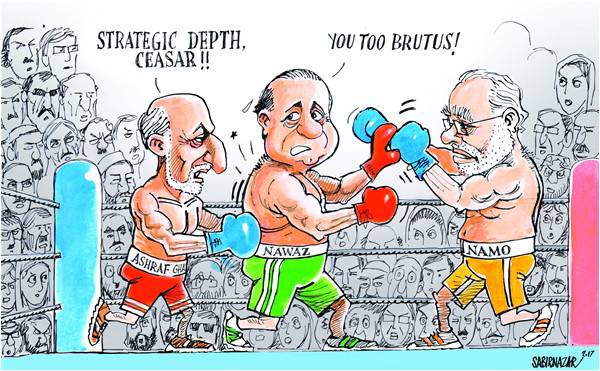
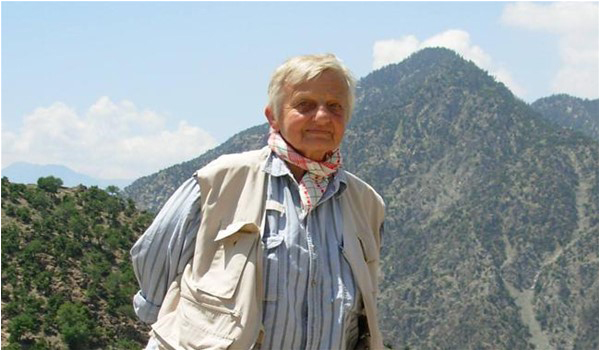
Maureen Lines
Sir,
Such soulful pageants and panegyrics
to someone who never dies…
by the roadside of our daily travels, howsoever grey...
the likes of whom burn an eternal candle...
burnishing man’s yearning for the truth to serve...
you must have visited the petrichor in your parched minds
severally which lingers on to permanently stay
as the violets of the Kalash meadows
these signs of grandeur and holiness
only a few blessed hearts and saints
like Mo! make the story of life worth telling
Riaz Noor,
Via email.
Tree tsunami
Sir,
Pakistan’s forest cover constitutes approximately 4.4% of its total land area, which must be of 25% as per international standards. Although the initiative of Khyber Pakhtunkhwa government to plan a billion trees in a tsunami afforestation project must be commended, it intends to increase the forest cover by 2% only and must take into account the ecological conditions of that particular area.
Without prior knowledge and understanding of its ecology, plantation cannot be carried out thoughtlessly. The introduction of new exotic safeda (Eucalyptus) trees would have serious and unprecedented repercussions for the environment if they are planted in an already water-stressed area. It would turn the tsunami into a water fiasco. No doubt, this tree has the capacity to grow fast but it restricts the growth of native species by releasing compounds, consumes excessive water, its heavy branches become lethal to forest dwellers, its oil is highly flammable and it cannot endure cold temperatures. We must promote native or indigenous species for afforestation programs in light of suitable and favourable climatic conditions. Thus, all stakeholders must join hands to bring reforms and adaptive strategies in keeping with the local ecology of the land and must not squander the nation’s resources on this futile and fruitless exercise.
Haider Ali,
Lahore.
RIP Maureen Lines
Celebrated British social worker and environmentalist Maureen Lines, a “great friend of the people of Pakistan’s northern valleys” as Nasser Yousaf described her in these pages, passed away on April 17, 2017. Indeed, TFT was fortunate to count the ‘Grand Dame of Kalash’ (see our edition of April 21) as one of our writers. Reproduced below are poems written in her honour by poet Sir Ejaz Rahim and Riaz Noor.
To Maureen
This is my third for you
The first celebrating your passion
For Chitral’s Shangri La
Where decimated natives dream
Of growing tall like pines
In virgin forests
The second extolling
Your maternal resilience
To protect and save our heritage
Against wanton carnage
And the free-wheeling fiend
Of all-stealing corruption
But now, Maureen,
This is a poem penned
By someone who feels sad
At your passing
Because he knows that after
You have left
Few will have the strength
To embrace the disowned
And the dispossessed
After one’s death
The body returns to earth
The mind is entombed
In the print of one’s books
But I truly wonder
If a spirit like yours
That knows no surrender
To injustice
Shall ever rest content
Without resuming
Your glorious struggle
In yet another battlefield!
Sir Ejaz Rahim,
Former chief secretary KP,
via email.
Cricket woes
Sir,
It is commonly stated by cricket gurus that the Pakistan cricket team is one of the most unpredictable teams in the world. Our heroes score zeros with such fervor that audiences are rendered dumb. Winning and losing is part of a game but losing without fighting or without putting in 100% effort is not forgivable.
Our cricket history is replete with shabby performances whereas other teams do not play such cricket so often. Even minnows have more stay and resistance in their batting line. Our team lost the 2nd Test against West Indies at Bridgetown and made a mockery of itself. Everyone ridiculed the batting performance. Instead of showing any regret or accepting responsibility, the bigwigs plunged into a useless debate. This is how our management works. It is hoped that team will do something.
Iftikhar Mirza,
Islamabad.
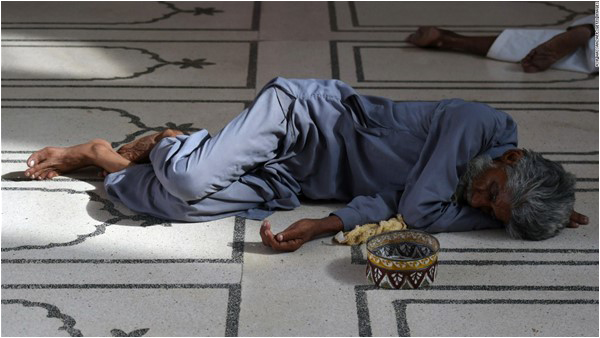
Heat in Karachi
Sir,
Heat stroke is also known as sunstroke, thermic fever, or siriasis. It happens when the body’s mechanisms that control temperature fail. Heat stroke is a life-threatening emergency needing immediate treatment. While many people feel sick and faint during heat waves, most of these people are suffering from heat exhaustion, a related condition usually less serious than heat stroke.
There are two types of heat stroke: classic, non-exertional heat stroke and exertional heat stroke. Classic heat stroke occurs most commonly in very young or older individuals, who have health risks and are in poor environmental conditions. Exertional heat stroke occurs more often in younger, healthy individuals who participate in strenuous physical activity.
Karachi is facing the probability of high heat waves, along with a shortage of water and an increase in electricity load shedding. Just two years ago, in 2015, CNN reported that 1,000 people died in the summer of the heatwave and 7,000 needed medical treatment. A state of emergency was declared at all public hospitals and the morgues overflowed with bodies.
According to the forecast, Karachi is again going to see a hot summer. It does not help that thousands of trees have been axed across the city over the years. Environmentalists have long sounded alarm bells on Karachi’s reducing green cover, which would mitigate some of the effects of heat.
Mayor Waseem Akhtar has been in action, however, rolling out orders on preparation for all government and private hospitals. He wants KMC city wardens to be trained to deal with such emergencies as well. Ramadan is around the corner. Dr Baqir at Aga Khan University Hospital advises staying hydrated at sehri, iftar and post-iftar. He urges people to drink water, juice, milk and anything with water content but says that people should avoid tea, coffee and caffeinated drinks which are diuretics and leach the body of water. They will make you urinate more and eventually dehydrate your body. He adds that the elderly and sick are discouraged from fasting; but if they are fasting, they must stay indoors.
Syeda Vaniya Ali,
Karachi.
Bullying
Sir,
Bullying has become a problem for young people. Threatening someone verbally over the mobile phone or over the internet through social networks like Facebook is common. It is known as cyber bullying. According to a study done in 25 countries, Pakistan ranks 22 for cyber bullying. Pakistan has been included on the list of fastest-growing countries that are using the internet, which is why cyber crime is increasing. Women are most likely victims. It was reported that a 16-year-old girl committed suicide in Karachi because the owner of the house where she worked harassed and bullied her. Many cases are never reported.
Komal Kanza,
Karachi.
Pollution problem
Sir,
Pollution in Karachi is increasing. Every single street is dirty. This condition is affecting people a lot. They are suffering from diseases. People are irritated. Nobody seems to care about it. The city government is mainly responsible for keeping the city clean and pollution-free. It is high time that the authorities paid attention to the hazards of pollution.
Haya Ahmed,
Karachi.
Open sky schools
Sir,
The students of Government Primary School Gharasa Kokarai, near Mingora city of Swat, GPS Sarbala in tehsil Kabal and GPS Areen in Tehsil Behrain of Swat
study under the open sky. The government has not built them roofs. The valley of Swat was affected by terrorism and this hit students the most. As a result, many schools do not have proper buildings and facilities.
Dozens of governments schools are in a bad condition. The students are talented but they need help. The Khyber Pakhtunkhwa government needs to take notice about this.
Waqar Ahmad Swati
Mohallah Kass village
Pokoza Bandai, Swat.
Living in Karachi
Sir,
Karachi, the biggest city of Pakistan, is rightly called a city of problems. If one problem is solved, another problem lies in wait for its residents. Its population has increased rapidly. One of these problems is the shortage of electricity and water. Another problem which tops the list is traffic with its attendant chaos and noise pollution. People don’t follow traffic rules, thus, many accidents lead to a loss of life.
Karachi has pollution. Garbage is not properly dumped or treated. The sewage system is breaking down with dirty water often spilling out. I request the government to analyze these problems and find solutions before they become uncontrollable.
Insia Fatima,
Karachi.
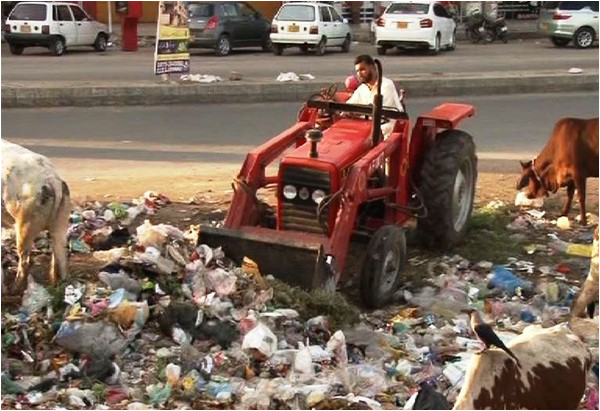
Religious extremism
Sir,
A situation has been reported in Hub (Balochistan) concerning an alleged blasphemy case against a Hindu man who allegedly shared some content on social media. Harassment of the weak due to their faith is no secret in Pakistan. The persecution of Ahmadis, Christians and also some “majority” groups continues unabated despite the Pakistani state’s overt claims of implementing the “National Action Plan”.
This mindset has been deliberately created by a fear-mongering state narrative in the last three decades, dictated by the establishment’s peculiar security interests. Primarily the reason behind this fear was the East Pakistan debacle. The ‘Fall of Dhaka’ penetrated deep into the mindset of the Pakistani state and in the post-war analysis it came up with the diagnosis that if Pakistan were ‘religionised’ enough this fiasco would not have taken place.
This thought process was strengthened in the last days of a united Pakistan when only far-right religious elements actively supported and aided whatever was left of the Pakistani establishment in the Eastern wing. Instead of undertaking a historical and factual analysis of the situation, the Pakistani establishment only came up with a reactive solution for the remaining part of Pakistan.
The state’s policy to create homogeneity through religion seems to have proven counterproductive. Pakistani society is now divided on religious lines. The journey has clearly been from religion to sectarianism. The state added further fuel to the fire by taking sides in this mess owing to its “security interests” particularly in the 80s and 90s. Consequences of this exclusivity are now manifesting themselves on a daily basis, whether it is Mashal Khan’s lynching, the killings of Ahmadis, the forced conversions of Hindus in rural Sindh and now blasphemy allegations in what otherwise has been the most secular part of Pakistan. It is hard to sense any sense in this policy of state except the vague idea of “national interest”.
It has been an enigma all through the history of Pakistan to comprehend the concept of “national interest”. Who qualifies to determine national interest? And how do its imperatives impact public policy in Pakistan? It is somewhat understandable that in a “Theo Democracy” the components of public policy are rooted in advocacy rather than analysis, however this framework has done more bad than good for the country. Radicalisation of Pakistani society seems horribly well done; bravo to its architects. Will this continue or will the Pakistani state would ever take the correctional path?
Malik Atif Mahmood Majoka,
Melbourne, Australia.
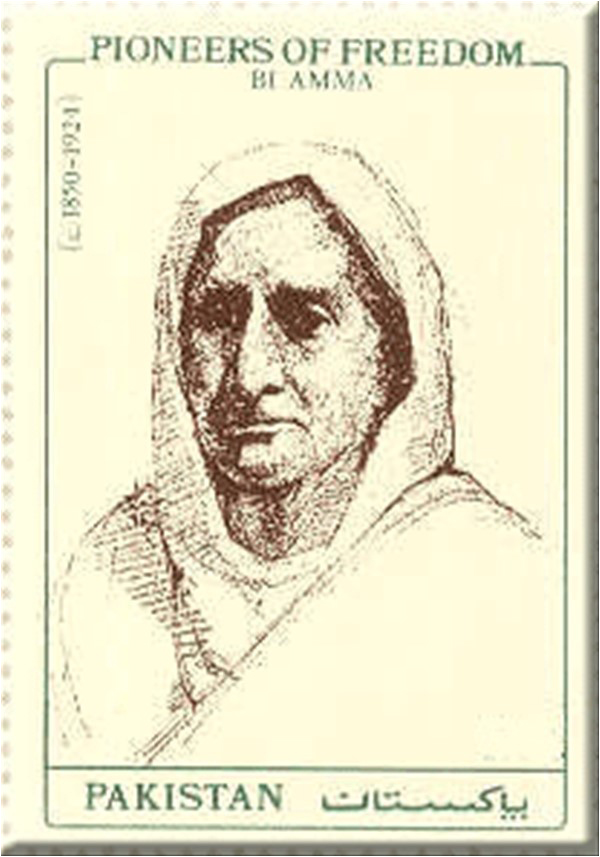
Women of Pakistan
Sir,
This refers to the public meeting at Okara, addressed by the Prime Minister, who made certain “adverse remarks” about the women participants of a PTI public meeting in Islamabad as reported by the press. The remarks attributed to the prime minister, I am sure, must be simply a slip of the tongue, which he never meant by heart. But the opposition parties were quick enough to make it an issue.
Women are respected not only in Pakistan but all over the world. In all societies and religions women enjoy a very special status. In Islam, Paradise is said to be at the feet of a mother. Unfortunately, in the politics in Pakistan even women are not spared, and our political parties will target them.
In the elections of the 1970s shameful words were used against the honorable mother of ZAB, similarly in the elections of 1977, photographs of Begum Nusrat Bhutto were spread. While resorting to such shameful and disgraceful tactics, our political parties simply forget the noble and august status granted to women.
At the PTI Islamabad public meeting there were mothers, sisters and daughters of Pakistan, and each participant irrespective of gender, caste, religion or creed was as respectful as any Pakistani. While making comments about the womenfolk of the country our political leadership should not forget the exemplary role played by them in the history of Pakistan. Abadi Begum commonly known as Bi Amma, the great mother of the Jauhar brothers, encouraged her sons to fight for freedom and when they were behind bars she sent a message that she would not forgive them if they give up their cause. Begum Muhammad Ali Jauhar was the only women in the Muslim League working committee and wearing a burka she even addressed public meetings.
There is a long list of such women such as Mohtarma Fatima Jinnah, known as Madr-e-Millat, who remained with the Quaid in his struggle for Pakistan. And in 1964 she challenged the dictator of that time in the presidential elections.
Then there is the glowing example of Princess Abida Sultana, who on the call of the Quaid left her state of Bhopal, the richest in the whole of the Sub-Continent and with just one suitcase and a small son opted for Pakistan. Begum Liaquat Ali Khan is another such example, who stood with her husband, Jinnah’s right-hand man, in all adverse circumstances. As the wife of a nawab and the prime minister, she spent her entire life in a rented house, she also worked as the secretary of Liaquat Ali Khan without any salary when Quaid-e-Millat was the general secretary of the Muslim League. After independence, who can deny the role of Begum Nusrat Bhutto and Shaheed Benazir Bhutto in fighting against dictatorial rule and for democracy?
Aamir Aqil,
Lahore.

Overloaded flight
Sir,
Apropos the shocking revelation by PIA CEO Nayyar Hayat about a serious violation of flight safety by a pilot going unpunished. On 20 January 2017 he took seven extra passengers on PK 743 from Karachi to Madinah, a three-hour flight. PK 743 could only take 409 passengers but it took 416. Four months have passed and no action has been taken.
PIA has just been given a billion-rupee financial bailout package but this will, in all likelihood, go down the drain, if management does not enforce financial and administrative discipline.
Every passenger exiting through immigration in Pakistan and entering any country including Saudi Arabia is documented. What is disturbing is the fact that the flight attendants who reported this irregularity, instead of being appreciated and encouraged were grounded, while the pilot continued to operate flights during the tenure of former CEO Hildebrand who has been sacked on charges of massive corruption and irregularities.
Equally criminal is the passive role of the CAA which should have suspended the pilot’s license, ordered an investigation and filed criminal charges against him. In any other country this serious flight safety breach in which excess passengers did not have access to emergency oxygen and passenger seat safety belt and life jackets would have had serious repercussions for the airline.
The pilot accused of this criminal breach of flight safety is already under litigation for submitting fake qualifications and has even managed to get rehired on contract. A judicial stay order is time limited and its extension can only be possible by connivance of prosecution which in this instance is PIA management. It points to serious administrative irregularities in the national airline’s management, its flight operations department, Legal Division and flight safety section, apart from the unpardonable silence of CAA and Ministry of Aviation.
Aneela Chandio,
Sukkur.

